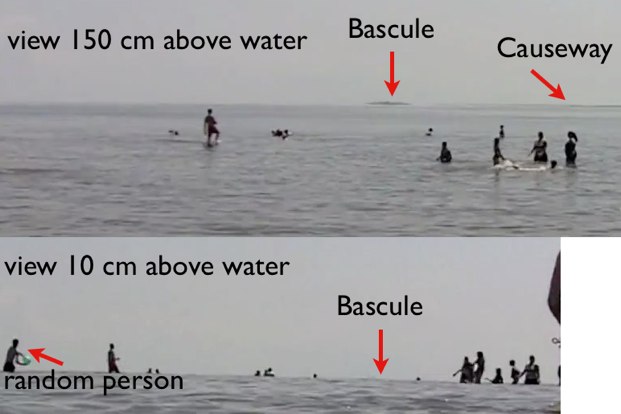Difference between revisions of "Sinking Ship Effect Caused by Ocean Swells"
Tom Bishop (talk | contribs) |
PeteSvarrior (talk | contribs) m (Reverted edits by 107.167.244.83 (talk) to last revision by Tom Bishop) Tag: Rollback |
||
| (2 intermediate revisions by 2 users not shown) | |||
| Line 3: | Line 3: | ||
==Sinking Bascule== | ==Sinking Bascule== | ||
| − | The following image was [http://web.archive.org/web/20190415221702/https://www.theflatearthsociety.org/forum/index.php?topic=50529.0 provided to us] as evidence for | + | The following image was [http://web.archive.org/web/20190415221702/https://www.theflatearthsociety.org/forum/index.php?topic=50529.0 provided to us] as evidence for Earth's curvature: |
[[File:Sinking ship swell.jpg]] | [[File:Sinking ship swell.jpg]] | ||
Latest revision as of 17:22, 15 October 2022
It has been determined that, at times, the sinking ship can be caused by the swells on the water between the observer and the target body.
Sinking Bascule
The following image was provided to us as evidence for Earth's curvature:
Thork says:
“ [...] there is a wave in the way on your picture. The earth does not curve by a foot to cover the bodies of people just 20 yards in front of you. ”
Ski says:
“ Brilliant use of a picture to show that relative altitude and obstructions at distance produce the "sinking ship" effect, and not the curvature of the earth. Thank you. ”
On The Dimensions of Ocean Waves
In Earth Not a Globe its author provides a citation from "On the Dimensions of Ocean Waves" by Admiral Coupvent de Bois:
“ It is not easy to ascertain the height of the waves of the ocean; nevertheless, the method adopted for the purpose is capable of affording sufficiently exact results. The point in the shrouds corresponding with a tangent to the tops of the highest waves is ascertained by gradually ascending them, and making observations until it is reached. That point being determined, the known dimensions of the ship give the height of the waves above the line of flotation, which corresponds with the horizon of the sea, in the trough of the wave. In this way the following results were obtained:-- ”
| With | a smooth sea | the waves were | 1.97 | feet. |
| " | fair weather | " | 3.28 | " |
| " | a slight swell | " | 4.921 | " |
| " | a full swell | " | 7.546 | " |
| " | a great swell | " | 10.827 | " |
| " | a very great swell | " | 15.42 | " |
| " | a heavy sea | " | 20.67 | " |
| " | a very heavy sea | " | 28.543 | " |
“ The lengths of the waves have also been measured, and it has been found that, for example, waves of 27 feet in height, are about 1640 feet in length. ”

